Hyundai IONIQ 5 vs Peugeot 208 - Differences and prices compared
Costs and Efficiency:
Looking at overall running costs, both models reveal some interesting differences in everyday economy.
Peugeot 208 has a convincingly advantage in terms of price – it starts at 20700 £, while the Hyundai IONIQ 5 costs 38500 £. That’s a price difference of around 17803 £.
In terms of energy consumption, the advantage goes to the Peugeot 208: with 14.10 kWh per 100 km, it’s a bit more efficient than the Hyundai IONIQ 5 with 15.60 kWh. That’s a difference of about 1.50 kWh.
As for range, the Hyundai IONIQ 5 performs distinct better – achieving up to 570 km, about 138 km more than the Peugeot 208.
Engine and Performance:
Under the bonnet, it becomes clear which model is tuned for sportiness and which one takes the lead when you hit the accelerator.
When it comes to engine power, the Hyundai IONIQ 5 has a convincingly edge – offering 650 HP compared to 156 HP. That’s roughly 494 HP more horsepower.
In acceleration from 0 to 100 km/h, the Hyundai IONIQ 5 is decisively quicker – completing the sprint in 3.50 s, while the Peugeot 208 takes 8.30 s. That’s about 4.80 s faster.
In terms of top speed, the Hyundai IONIQ 5 performs clearly perceptible better – reaching 260 km/h, while the Peugeot 208 tops out at 200 km/h. The difference is around 60 km/h.
There’s also a difference in torque: Hyundai IONIQ 5 pulls convincingly stronger with 770 Nm compared to 270 Nm. That’s about 500 Nm difference.
Space and Everyday Use:
Cabin size, boot volume and payload all play a role in everyday practicality. Here, comfort and flexibility make the difference.
Seats: offers more seating capacity – vs .
In curb weight, Peugeot 208 is clearly lighter – 1165 kg compared to 1955 kg. The difference is around 790 kg.
In terms of boot space, the Hyundai IONIQ 5 offers distinct more room – 520 L compared to 352 L. That’s a difference of about 168 L.
In maximum load capacity, the Hyundai IONIQ 5 performs clearly perceptible better – up to 1580 L, which is about 417 L more than the Peugeot 208.
When it comes to payload, Hyundai IONIQ 5 to a small extent takes the win – 530 kg compared to 430 kg. That’s a difference of about 100 kg.
Who comes out on top?
Overall, the Hyundai IONIQ 5 shows itself to be wins the duel decisively and secures the title of DriveDuel Champion.
It convinces with the more balanced overall package and proves to be the more versatile choice for everyday use.
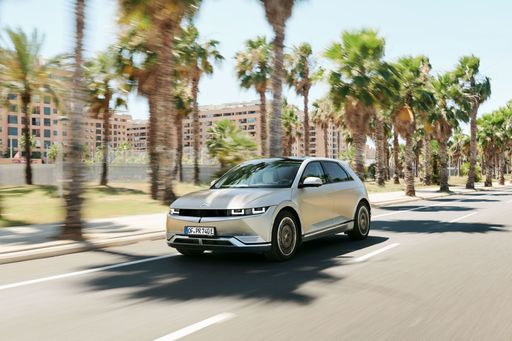 @ Hyundai Motor Company
@ Hyundai Motor Company
Hyundai IONIQ 5
Costs and Consumption
View detailed analysis
Engine and Performance
View detailed analysis
Dimensions and Body
View detailed analysis
Hyundai IONIQ 5
The Hyundai IONIQ 5 looks like a spaceship that moved into suburbia, pairing bold retro‑futuristic styling with a roomy, cleverly laid-out cabin that makes long trips surprisingly comfortable. Its electric character delivers instant, silky acceleration and low running costs, making it a smart, slightly cheeky pick for buyers who want tech, practicality and personality without the drama.
details @ Hyundai Motor Company
@ Hyundai Motor Company
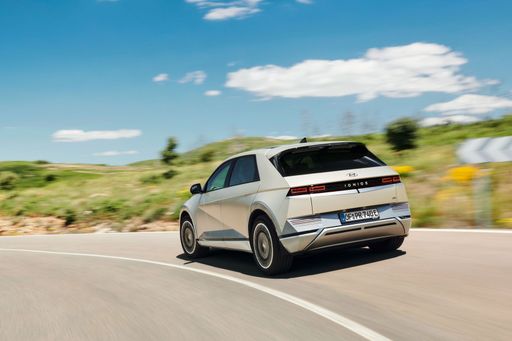 @ Hyundai Motor Company
@ Hyundai Motor Company
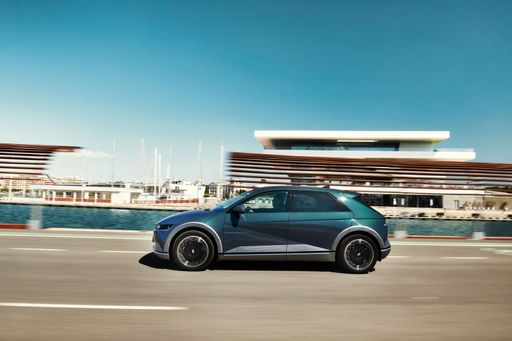 @ Hyundai Motor Company
@ Hyundai Motor Company
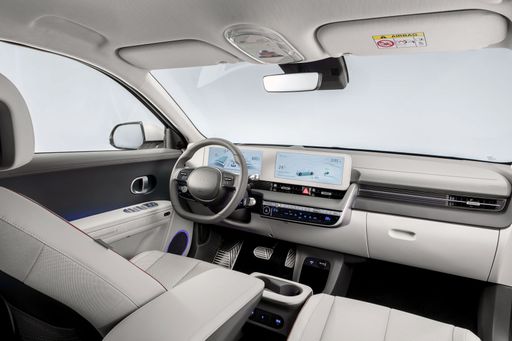 @ Hyundai Motor Company
@ Hyundai Motor Company
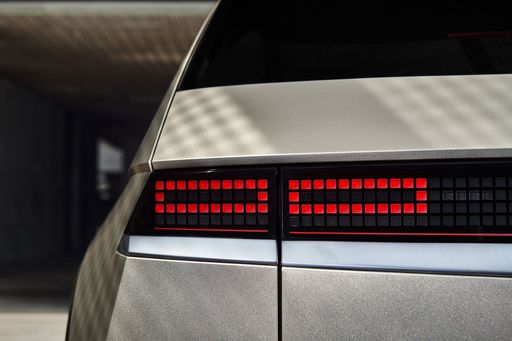 @ Hyundai Motor Company
@ Hyundai Motor Company
Peugeot 208
The Peugeot 208 feels like a city-savvy fox: compact, stylish and surprisingly grown-up, with a cabin that punches above its weight and enough personality to make daily commutes a little less boring. It’s a smart pick for buyers who want chic practicality without the showroom bluster — easy to park, thrifty to run and oddly fun when the road tightens up.
details @ Peugeot / Stellantis Media
@ Peugeot / Stellantis Media
 @ Peugeot / Stellantis Media
@ Peugeot / Stellantis Media
 @ Peugeot / Stellantis Media
@ Peugeot / Stellantis Media
 @ Peugeot / Stellantis Media
@ Peugeot / Stellantis Media
 @ Hyundai Motor Company
@ Hyundai Motor Company
|
 @ Peugeot / Stellantis Media
@ Peugeot / Stellantis Media
|
|
|
|
Costs and Consumption |
|
|---|---|
|
Price
38500 - 64200 £
|
Price
20700 - 35200 £
|
|
Consumption L/100km
-
|
Consumption L/100km
4.5 - 5.2 L
|
|
Consumption kWh/100km
15.6 - 21.2 kWh
|
Consumption kWh/100km
14.1 - 15.4 kWh
|
|
Electric Range
440 - 570 km
|
Electric Range
362 - 432 km
|
|
Battery Capacity
63 - 84 kWh
|
Battery Capacity
46 - 51 kWh
|
|
co2
0 g/km
|
co2
0 - 117 g/km
|
|
Fuel tank capacity
-
|
Fuel tank capacity
44 L
|
Dimensions and Body |
|
|---|---|
|
Body Type
SUV
|
Body Type
Hatchback
|
|
Seats
5
|
Seats
5
|
|
Doors
5
|
Doors
5
|
|
Curb weight
1955 - 2275 kg
|
Curb weight
1165 - 1530 kg
|
|
Trunk capacity
480 - 520 L
|
Trunk capacity
309 - 352 L
|
|
Length
4655 - 4715 mm
|
Length
4055 mm
|
|
Width
1890 - 1940 mm
|
Width
1745 mm
|
|
Height
1585 - 1605 mm
|
Height
1430 mm
|
|
Max trunk capacity
1540 - 1580 L
|
Max trunk capacity
1118 - 1163 L
|
|
Payload
385 - 530 kg
|
Payload
380 - 430 kg
|
Engine and Performance |
|
|---|---|
|
Engine Type
Electric
|
Engine Type
Petrol, Electric, Petrol MHEV
|
|
Transmission
Automatic
|
Transmission
Manuel, Automatic
|
|
Transmission Detail
Reduction Gearbox
|
Transmission Detail
Manual Gearbox, Reduction Gearbox, Dual-Clutch Automatic
|
|
Drive Type
Rear-Wheel Drive, All-Wheel Drive
|
Drive Type
Front-Wheel Drive
|
|
Power HP
170 - 650 HP
|
Power HP
101 - 156 HP
|
|
Acceleration 0-100km/h
3.5 - 8.5 s
|
Acceleration 0-100km/h
8.3 - 10.9 s
|
|
Max Speed
185 - 260 km/h
|
Max Speed
150 - 200 km/h
|
|
Torque
350 - 770 Nm
|
Torque
205 - 270 Nm
|
|
Number of Cylinders
-
|
Number of Cylinders
3
|
|
Power kW
125 - 478 kW
|
Power kW
74 - 115 kW
|
|
Engine capacity
-
|
Engine capacity
1199 cm3
|
General |
|
|---|---|
|
Model Year
2024 - 2025
|
Model Year
2023 - 2025
|
|
CO2 Efficiency Class
A
|
CO2 Efficiency Class
D, A, C
|
|
Brand
Hyundai
|
Brand
Peugeot
|
What drive types are available for the Hyundai IONIQ 5?
The Hyundai IONIQ 5 is available as Rear-Wheel Drive or All-Wheel Drive.
The prices and data displayed are estimates based on German list prices and may vary by country. This information is not legally binding.
